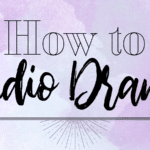Introducing “How to Audio Drama”

Last updated on March 2nd, 2020
Here at Discover Pods, we’ve recognized that often, people who start out as podcast fans become creators–but how do you make a smooth transition from one to the other, especially with something as complicated as an audio drama? To bridge that gap, we’re bringing you a new weekly column: How to Audio Drama. In this series, I’m going to help explain everything you need to make an audio drama from start to finish, going into as many nitty-gritty details as I can. The series will go step by step in the process of making an audio drama, complete with a Table of Contents and buttons to help you move through the series quickly as it accumulates–but if you’re only looking for specific areas of advice, each issue will also stand completely on its own.
But in order to give you confidence in my advice, let me give some background on my credentials. Since the days before iPods, when listening to podcasts was only streaming off websites or downloading individual episode files, podcasts have been my favorite kind of media. I’ve been around for all of the changes the industry has seen, and about four years ago, I started writing podcast criticism and reviews. Ever since finding ars PARADOXICA, my main focus has been audio drama–and because I was writing about audio dramas before most other writers, I’m lucky enough to have learned about how to make an audio drama from many of the greats.
But writing and making are very different. When I decided to put my mic where my mouth is–um, but, like in the way that you put your money where your mouth is?–and actually make an audio drama, I ran into a predicament very specific to myself. I had to make an audio drama (an already complex task) that stood up to my own advice and criticisms given to others in the past.
And to be clear, I’m not always sure my audio drama, VALENCE, does! But it’s certainly better off than if I hadn’t done all this work, and it’s certainly something I’m proud of.
Before putting anything down on the page, I not only went through all of my own writings and the sources I used to write them. I scoured websites for advice. I joined countless Facebook groups. I took notes on chats in Discord servers about best practices. I drudged up old resources and texts and assignments from my undergrad creative writing courses. I looked online for curricula, textbooks, and anything else I could find from screenwriting classes. I took grad classes that felt applicable–but don’t get excited about that. Here’s my first piece of advice: don’t work two full-time jobs and do grad school while also making an audio drama. I dropped out of grad school and quit one of my jobs and I’m still tired.
All of which is to say that through years of amassing knowledge and resources and then putting them to the test, I’m at a place where I can share everything I’ve learned here on Discover Pods. How to Audio Drama isn’t just going to be about how to edit dialogue or do sound design. It’s going to be about every part of making an audio drama. I’m going to discuss concept, plot structure, building characters, and how to write a screenplay–all things I learned from creative writing and screenwriting resources. I’m going to discuss building a creative team, paperwork, and handling conflict–all things I learned from my desk job’s professional development opportunities and panels by entertainment attorneys. And yes, I’m going to talk about dialogue editing and sound design.
But there are some things about making an audio drama I haven’t experienced, but others may have. There are questions readers like you might have about making an audio drama but are too shy to ask, or asking could lead to even more conflict. That’s why every fourth edition of How to Audio Drama will be an anonymous advice column where I help answer your questions. If I don’t know the answer off the bat, I’ll definitely know who to ask for you. Think of me as your Dear Abby (or, because podcasts, Dear Prudence) of audio drama.
Already have a question brewing? Wonderful; I’m already taking submissions. You can send your anonymous question using this quick Airtable form:
Making an audio drama is a gratifying, terrifying process unlike any other creative endeavor I’ve worked on. It takes a monumental amount of time, energy, recources, and emotions–but the rewards are so worth it. I’m excited to be on this journey with you. I hope my advice each week will guide and support you, or at least make you feel a little less nervous. Join me next week for our first discussion: how to do your audio drama homework before you start planning.











1 comment
This is super cool. Audio dramas are so involved. Looking forward to the series!
Comments are closed.